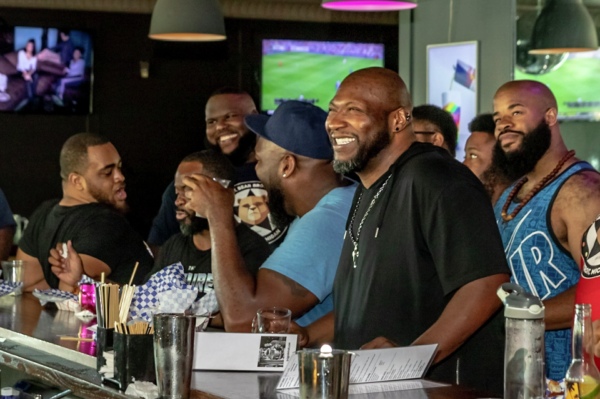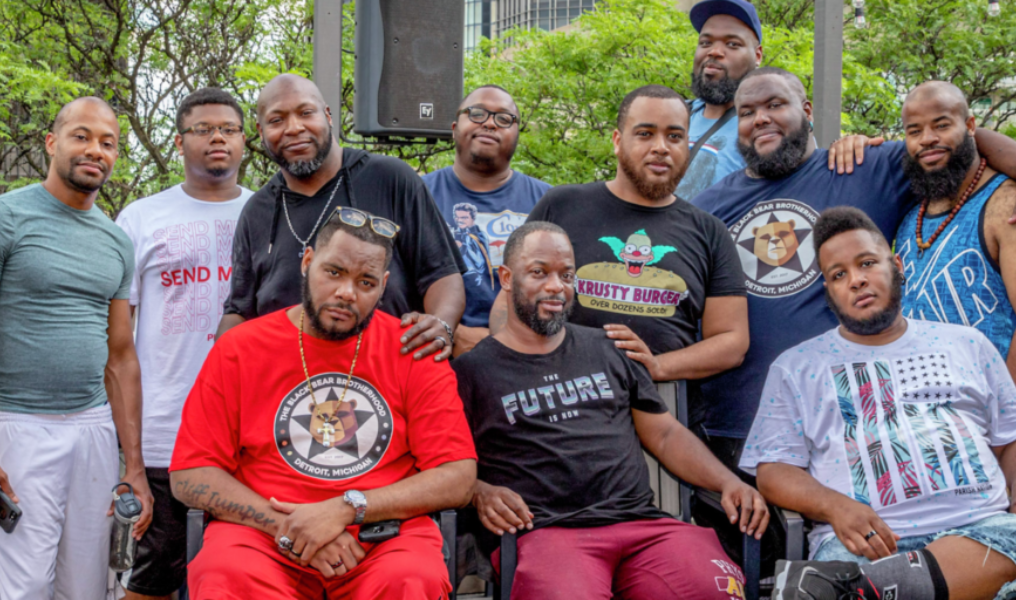For many members of the LGBTQ community it's a familiar uncomfortable feeling: walking into a public or social space and feeling unsure if being open about one's identity will be welcomed or not. And depending on the progressiveness of a person's community, situations like this one might, intentionally or not, be frequent. This issue can be complicated further, too, for those who do not have the luxury of being discreet about their sexual orientation or gender identity. And for LGBTQ people of color, instances of discrimination are even more frequent. It's also something with which Black Bear Brotherhood Founder L. Michael Gipson was all too familiar.
"Detroit is my sixth city since high school. And so, you get kind of good at making new friends and being the new person in the state," he said. "I've lived in Detroit for about 4 ¬Ω, going into five, years come October. … One of the things that I noticed was that most of what was available for black gay men are catered to a couple of markets. So, if you were young and urban there was the Woodward. … If you were white you had multiple places that you could go to depending on your scene."
But for bears, gay men of size often with a lot of body hair, and specifically for those of color over 30, there were no regular hangouts or meetup spots available.
"They could congregate at the Hayloft (Saloon) or at Menjos', grab a beer, and they would all be more or less in the corner together," Gipson said. "It wasn't like they were in seamlessly integrated spaces where they were part and parcel of the community and [in] those rooms it was very clear that they were not."
So, roughly two years into living in Detroit, Gipson decided to throw a party. Unbeknownst to him, that gathering would take off and eventually become one of Detroit's newest LGBTQ social collectives: The Black Bear Brotherhood.
First Meetings
After mulling over what kind of celebration would be best, Gipson settled on a tradition that he had seen done in Philadelphia "back in the early aughts."
"[It] also piggybacked off of other black traditions in the arts movement and in women's organizing, which was simply to have a potluck," he said.
It was then that he asked for the help of Chris Sutton, another bear who he had met via nonprofit work. Gipson asked him to use his popularity among other bears to spread the word among the community.
"When we went over for the first potluck it was one of those types of things where it almost felt like stars were aligning and the universe was connecting us all together, because the energy was so genuine and so authentic," Sutton said. "And I'm someone who is born and raised here in Detroit, I've been here my entire life, someone who has really tried to invest themselves in the LGBT, especially the black LGBT community. And one of the things that I've noticed is that you have some spaces where people in our community come together, in places like Menjo's and the Hayloft, but to be honest, sometimes those spaces are predominantly white and not welcoming to people of color."
Since that first meeting of roughly a dozen people, it wasn't long before the potlucks became a regular, monthly occurrence, and bears from across the Metro Detroit area were making their way to Gipson's home. Gipson, who now works as a nonprofit consultant, said that in his work experience he's often been tasked with forming community groups similar to this one across various cities. However, he approached this one differently because he wanted to make a sustainable model that "people had ownership over from the start." So, for BBB, that meant a collaborative attitude.
"Everything is always 'our' from the very first day and, 'What do y'all want to do? What can we do together?'" Gipson said. "And so, out of that came the logo and mission statement. I think that's one thing that we know as black men, as gay men and as men of size is that you kind of become out in public — and even within our own community — just that one thing. And … we have needs that go beyond those social identities."
Thus the official mission statement was born, declaring that the BBB is "committed to fostering the social connectivity, health, wellness, political, creative and financial wellbeing of Black gay, bisexual, gender non-conforming and same-gender-loving men of size and their allies."
The group even garnered national attention from groups like The Counter Narrative Project, an Atlanta political advocacy group for black gay men and their allies, that collaborated and subsequently sponsored BBB's expansion efforts. That sponsorship helped get BBB active in community forum events on a variety of topics that affect those within the black bear community, ranging from things like love and dating, addiction, HIV and self-care. This sparked community partnerships with groups like the ONYX Great Lakes Chapter leather community.

Members of the Black Bear Brotherhood at an outing. BTL Photo: Jamie Feldman.
Black Bear Principles
Fast forward to a BBB meeting today and those in attendance will be a diverse bunch in the black bear community. Gipson said that that is intentional. He hopes that BBB will be a way for people not only to re-evaluate what they feel like is normal within the gay community but also within masculine spaces.
"Several members work security, several are factory workers with blue-collar jobs, some like guns — that is not what people think of when they think of gay men," Gipson said. "So, I wanted to make sure that people who wanted to be part of the space but were femme knew that they could be a part of the space and that they could come and bring all of their fabulousness into a room that included security guards and a cop. And so, those principles and our mission statement and our value statement all reflect those values."
Additionally, Gipson emphasizes that just because BBB spaces center masculinity, feminism is one of the group's principles along with compassion and personal and political evolution; at all BBB events any kind of bigotry is unwelcome.
"And if you say you want to be part of this, then this is what you're signing up for. Now, some of the principles are pretty aspirational," he said. "Like, people don't always do a good job of taking care of themselves first before they take care of others. People don't always do a good job of being their brother's keeper, but the idea was that we would say that this is the standard that we're expecting people to meet and when you fall short of the standard we now have permission to have that conversation with you to tell you that you're falling short, and how can we help you get back on track?"
Allies Invited
The Black Bear Brotherhood extends a welcome to those not directly in the black bear community, too. Those who are admirers or allies of the Bears are welcome to join in all of the group's events, outings and political events except for the monthly potlucks that are reserved for full members. The only qualification to become a full member, Gipson said, is to be a man of color.
"We went around and around and around on that quite a bit and part of it is that, you know, the space itself was an organically grown space," Gipson said. "There weren't any rules around it initially, and over time it wasn't just a men of color coming together thing. … But even people who have white partners didn't initially ask to bring them. … They could talk about their racial and ethnic issues without having to filter and have a safe space where other people might understand that based on their own experience."
Gipson said that it soon became clear that this type of discourse was valuable and key for members to feel comfortable when interacting with each other. Sutton agrees.
"We often don't have spaces where we feel welcome, where we feel seen, where we can feel safe. Especially, I think, now," Sutton said. "And it's incredibly important to have those spaces because, to be totally honest, if you walk through a typical mainstream pride or film festival or event or any type of social space, if you walk through that space you may be the only person of color in that space. No one is really questioning that or understanding how that may weigh heavy on that person who is the 'odd person out.'"
Sutton made clear also that the private potluck events are not designed to try and diminish the experience or value of other groups but to allow those in attendance to feel "truly free," even if it's only temporary.
"I hope people understand that we're not trying to alienate anyone, we're just trying to create a space where for once we can feel seen and we can feel comfortable being ourselves," he said.
To Find out more about the group, how to join and upcoming events, visit blackbearbrotherhood.life.
According to a joint Harvard, Robert Wood Johnson Foundation and NPR study called "Discrimination in America: Experiences and Views of LGBT Americans," these instances for LGBTQ people of color are almost double.
The study surveyed 489 LGBTQ adults over the course of four months and the majority reported experiencing "slurs" or "insensitive or offensive comments." Overall, one in five reported being personally discriminated against because of their sexuality or gender identity. However, when examining LGBTQ people of color within the group specifically, almost one in three reported discrimination.










